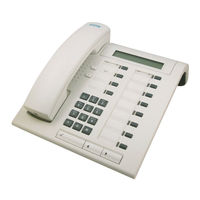Siemens optiset E advance comfort Phone Manuals
Manuals and User Guides for Siemens optiset E advance comfort Phone. We have 1 Siemens optiset E advance comfort Phone manual available for free PDF download: Operating Instructions Manual
Siemens optiset E advance comfort Operating Instructions Manual (110 pages)
on your HiPath 3000/HiPath AllServe
Table of Contents
Advertisement
Advertisement
Related Products
- Siemens optiset E advance optiset E advance plus
- Siemens Optiset E Advance Plus
- Siemens Optiset E Advance
- Siemens Optiset E Advance Conference
- Siemens Optiset E Standard
- Siemens Optiset E Entry
- Siemens optiset E memory
- Siemens optiset E conference
- Siemens Optiset E Standart
- Siemens optiPoint 420 Family
